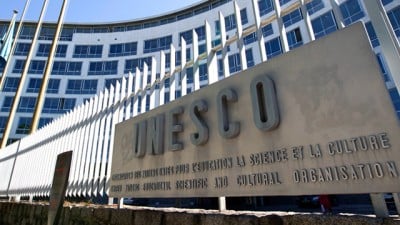
Jonathan Cook
Global Research
16 October 2017
At first glance, the decision last week by the Trump administration, followed immediately by Israel, to quit the United Nation’s cultural agency seems strange. Why penalise a body that promotes clean water, literacy, heritage preservation and women’s rights?
Washington’s claim that the UN’s Educational, Scientific and Cultural Organisation (Unesco) is biased against Israel obscures the real crimes the agency has committed in US eyes.
The first is that in 2011 Unesco became the first UN agency to accept Palestine as a member. That set the Palestinians on the path to upgrading their status at the General Assembly a year later.
It should be recalled that in 1993, as Israel and the Palestinians signed the Oslo accords on the White House lawn, the watching world assumed the aim was to create a Palestinian state.
But it seems most US politicians never received that memo. Under pressure from Israel’s powerful lobbyists, the US Congress hurriedly passed legislation to pre-empt the peace process. One such law compels the United States to cancel funding to any UN body that admits the Palestinians.
Six years on, the US is $550 million in arrears and without voting rights at Unesco. Its departure is little more than a formality.
The agency’s second crime relates to its role selecting world heritage sites. That power has proved more than an irritant to Israel and the US.
The occupied territories, supposedly the locus of a future Palestinian state, are packed with such sites. Hellenistic, Roman, Jewish, Christian and Muslim relics promise not only the economic rewards of tourism but also the chance to control the historic narrative.
Israeli archaeologists, effectively the occupation’s scientific wing, are chiefly interested in excavating, preserving and highlighting Jewish layers of the Holy Land’s past. Those ties have then been used to justify driving out Palestinians and building Jewish settlements.
Unesco, by contrast, values all of the region’s heritage, and aims to protect the rights of living Palestinians, not just the ruins of long-dead civilisations.
Nowhere has the difference in agendas proved starker than in occupied Hebron, where tens of thousands of Palestinians live under the boot of a few hundred Jewish settlers and the soldiers who watch over them. In July, Unesco enraged Israel and the US by listing Hebron as one of a handful of world heritage sites “in danger”. Israel called the resolution “fake history”.
The third crime is the priority Unesco gives to the Palestinian names of heritage sites under belligerent occupation.
Much hangs on how sites are identified, as Israel understands. Names influence the collective memory, giving meaning and significance to places.
The Israeli historian Ilan Pappe has coined the term “memoricide” for Israel’s erasure of most traces of the Palestinians’ past after it dispossessed them of four-fifths of their homeland in 1948 – what Palestinians term their Nakba, or Catastrophe.
Israel did more than just raze 500 Palestinian towns and villages. In their place it planted new Jewish communities with Hebracaised names intended to usurp the former Arabic names. Saffuriya became Tzipori; Hittin was supplanted by Hittim; Muyjadil was transformed into Migdal.
A similar process of what Israel calls “Judaisation” is under way in the occupied territories. The settlers of Beitar Ilit threaten the Palestinians of Battir. Nearby, the Palestinians of Sussiya have been dislodged by a Jewish settlement of exactly the same name.
The stakes are highest in Jerusalem. The vast Western Wall plaza below Al Aqsa mosque was created in 1967 after more than 1,000 Palestinians were evicted and their quarter demolished. Millions of visitors each year amble across the plaza, oblivious to this act of ethnic cleansing.
Settlers, aided by the Israeli state, continue to encircle Christian and Muslim sites in the hope of taking them over.
That is the context for recent Unesco reports highlighting the threats to Jerusalem’s Old City, including Israel’s denial for most Palestinians of the right to worship at Al Aqsa.
Israel has lobbied to have Jerusalem removed from the list of endangered heritage sites. Alongside the US, it has whipped up a frenzy of moral outrage, berating Unesco for failing to prioritise the Hebrew names used by the occupation authorities.
Unesco’s responsibility, however, is not to safeguard the occupation or bolster Israel’s efforts at Judaisation. It is there to uphold international law and prevent Palestinians from being disappeared by Israel.
Trump’s decision to quit Unesco is far from his alone. His predecessors have been scuffling with the agency since the 1970s, often over its refusal to cave in to Israeli pressure.
Now, Washington has a pressing additional reason to punish Unesco for allowing Palestine to become a member. It needs to make an example of the cultural body to dissuade other agencies from following suit.
Trump’s confected indignation at Unesco, and his shrugging off of its vital global programmes, serve as a reminder that the US is not an “honest broker” of a Middle East peace. Rather it is the biggest obstacle to its realisation.
A version of this article first appeared in the National, Abu Dhabi.
Jonathan Cook won the
Martha Gellhorn Special Prize for Journalism. His books include “Israel
and the Clash of Civilisations: Iraq, Iran and the Plan to Remake the
Middle East” (Pluto Press) and “Disappearing Palestine: Israel’s
Experiments in Human Despair” (Zed Books). His website is www.jonathan-cook.net.
Comments
Post a Comment